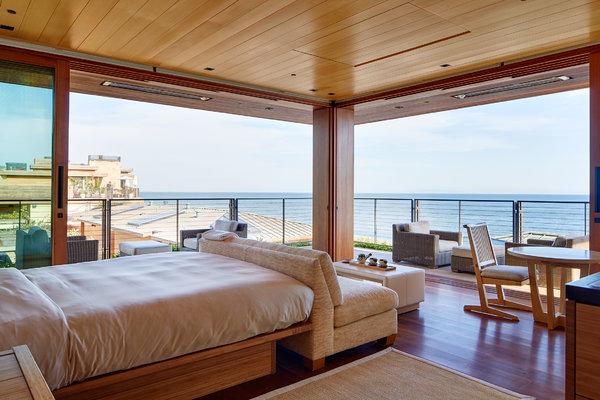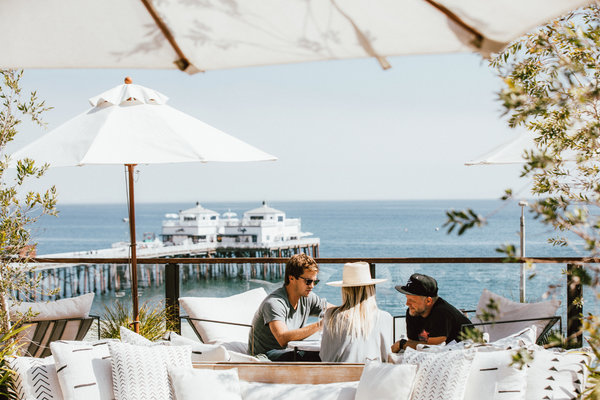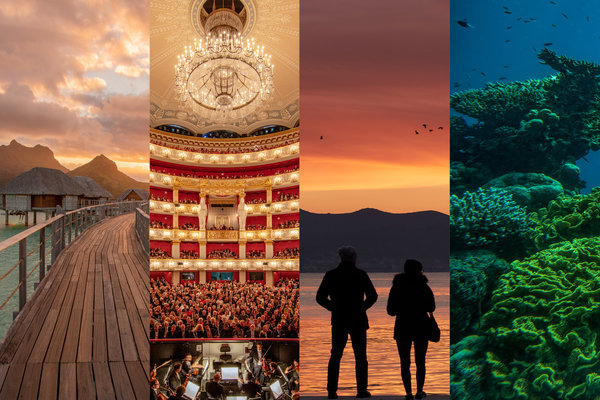Carbon Beach is a beguiling and exclusive crescent of sand along the Pacific Ocean in Malibu, famous — infamous might be a better word — for the long and mostly losing battle conducted by its wealthy homeowners to keep the public off this stunning mile of coastline.
It is also known as Billionaire’s Beach, a fitting reference to the Californians who have staked their claims there, a cast that has, over the years, included David Geffen, Larry Ellison, Jeffrey Katzenberg and Eli Broad.
Still, you don’t have to be a billionaire (or even a millionaire) to wake up in a room with floor-to-ceiling glass that makes you feel like you are sleeping atop the sands of Carbon Beach, to settle in for breakfast on a deck with views up and down the Pacific, to cast open the sliding doors and let the smells and sounds of the ocean wash over your room.
But it is going to cost you. A lot.
In 2017, the Nobu Ryokan Malibu, a homage to the serenity of a Japanese inn, opened on Carbon Beach, offering 16 rooms discreetly set in a maze of teak and glass, with two private walkways leading to the sand. It’s part of a chain of Nobu hotels and restaurants, whose owners include Nobu Matsuhisa, the chef, and Robert De Niro, the actor. Mr. Ellison, the billionaire co-founder of Oracle, whose home is just up the beach, is the principal owner of this West Coast Nobu venture. There are eight Nobu hotels across the world, but this is the only Ryokan.

Rooms are designated by name. The writer’s, with a wraparound deck, was the Suiheisen room, which is Japanese for horizon.CreditTrevor Tondro for The New York Times
An ocean-front room with a deck clocked in at $2,300 a night, not counting another $300 or so in taxes. During the off-season. And there is a two-night minimum, though the hotel was willing, at least on one occasion, to waive that. (The reservation was not in my name and the hotel did not know about my connection to The Times.) With a 4 p.m. check-in and noon departure, that comes out, pretax, to $115 an hour.
For that much money — figure $5,200 for two nights, taxes included — we probably could have jetted off to Japan and experienced a real ryokan, or, more practically, rented an entire house in Malibu for a few days. But instead we booked a hotel room. There are rooms that go for as little as $2,000 a night for a first-floor garden room (don’t expect to see the beach out your window). And if $2,300 a night isn’t enough of a splurge, an ocean front suite with skylights goes for $3,500 a night.
Was it worth it? Along with my spouse, Benjamin, I have, over the years, occasionally indulged in splurge hotels: the Post Ranch Inn in Big Sur, a Singita in South Africa. These can be enriching, even if your stomach drops when confronted with a tab that exceeds the cost of your first car. They can also make you wonder, when that credit card bill comes due, what on earth you were thinking.
And this is a year when California in general, and this part of California in particular, has been battered by mudslides, fires, windstorms and torrential rains. The Woolsey Fire that ripped across Malibu late last year stopped a few miles short of the Nobu Ryokan.
Drive a few miles north of the hotel on the Pacific Coast Highway and you’ll soon encounter grim reminders of the destruction: the burned-out shells of a cluster of homes on Point Dume — normally, a beautiful place to stroll the bluffs, looking down on the sea lions and tidal pools — and the wildflowers poking through what were hills of smoky embers. The hotel was forced to close during the worst of the fires; the Pacific Coast Highway was a stream of emergency vehicles and evacuees, and a thick and ominous bank of smoke rose above the horizon.
And the wildfires weren’t the end of it. A bank of cold, whipping rains followed, causing mudslides on the hillsides that had been stripped of greenery, closing down parts of the highway. The day we were originally supposed to check in, hotel management was exceedingly accommodating when we called to inquire about changing the reservation after waking up to torrential rains and a round of mudslide warnings.
There is a reason billionaires chose to make their homes (or one of their homes) in this part of Malibu. It has some of the most seductive coastline in the country: the hills, swaying with bright green grass, which will be brown before long, slope gently to the ocean. The waves are dotted with surfers, lit up in the seductive golden light that is California. Much of Malibu is wild and undeveloped; you can cross four lanes and take off into the hills, hiking trails that give views up and down the coast. An early morning jog through the mist on the beach can be a bracingly solitary experience.
All that, of course, is free.
Getting behind the doors
The Ryokan rests at the north end of a stretch of high-design exclusivity — a blur of low-lying teak and glass alongside a palette of sand and ocean — which includes Nobu Malibu, its sister restaurant, and the Little Beach House Malibu, a West Coast outpost for the London-based, members-only Soho House.

When we pulled up to the hotel one Saturday afternoon as motorcycles whizzed by us, the front doors were locked, as is the practice, to keep out the celebrity-seekers and tourists. After we identified ourselves as paying guests, a click of a switch at the front desk slid the doors open to reveal five hotel workers stationed in the lobby, welcoming us with bows, hot towels and a tour.
The lobby opens to an outdoor Japanese garden, lush with greenery and flowering trumpet vines, and a deck built from ipe wood overlooking the beach. It was empty when we were there; perhaps the guests preferred the wicker chairs set out on their private decks. During our time there, we did not run into another guest, though there was no shortage of housekeepers, groundskeepers and butlers. Off to one edge of the property, through a passageway that leads to a small, well-equipped gym, a lap pool glistened invitingly in the daytime sun, it too overlooked the beach. But it was also, unfortunately, closed because of what we were informed was a permit issue involving the city of Malibu.
But who wanted to swim?
Our room was up a flight of stairs, in a corner with a wraparound deck that faced the ocean to the west, and the Little Beach House and the Malibu hills to the south. A bowl of fresh fruit awaited us: pineapple, blackberries, raspberries, passion fruit and carved cantaloupe, as well as his-and-his pots of green tea.

Rooms here are designated by name. Ours was the Suiheisen room, which is Japanese for horizon. (It is known among staff as the Rock Star Suite.) It was not particularly large, but it was dramatic, with the walls of windows and a television screen hidden in the ceiling that lowered at the push of a button. The bathroom, in a nod to the hotel’s Japanese design influence, had a toilet seat that lifted automatically upon sensing motion in the bathroom; amusing at first, annoying before long.
And there was a Japanese teak soaking tub set on the deck facing the ocean, complete with a bowl of aromatic Himalayan salts to sprinkle in before drawing the water. Thick towels were draped over the back. Sitting in the tub, steam rising in the air, glancing at the boats bobbing on the swells as the sunlight faded was so serene (detoxifying was, I believe, the word of the day) that we almost didn’t want to leave for dinner.
But we did, of course, walking five minutes to the restaurant, where I had made a reservation on my own, though the hotel did volunteer, after we booked our room, to get us a table.
And there are few restaurants anywhere that match the dramatic setting and sheer verve of the Nobu Malibu, with its open-air dining room set right over the ocean and under the stars. We closed the place, along with Jack Dorsey, of Twitter and Square, who was eating a few tables away.
A ryokan in name only
In a traditional Japanese Ryokan, guests sleep on futons set on tatami mats on the floor and share a common bathing area. They are known as fairly humble accommodations. Breakfast and dinner are often included.
Humble is not the word that came to mind ocean-side in Malibu. The rooms at the Nobu Ryokan are equipped with cashmere robes by Loro Piana and custom-made yukatas, a kind of lightweight Japanese robe. Forget futons. These beds are done up in 800-thread count linens by Anichi. Though the room bar is well-stocked and the snacks, most from Dean & DeLuca, are included, alcohol is not.
Breakfast was in keeping with the open-your-wallet spirit of the hotel: Tacos with scrambled eggs and avocado was a fine way to start the day on the deck — but came to $22 for three bite-size tacos. Coffee was another $12, but at least it was French-press. (And it was punctual: ordered for 10 a.m., the knock on the door came at 9:59).
By the time we had eaten, it was nearly noon and the clock — and meter — was running on our stay, as I was only too keenly aware. At this price tag, a night like ours can be as much a source of anxiety as an escape. What if it rains? What if I’m late arriving? What if I don’t like my room?
For this much money, dare I wander off for a stroll up the beach or should I stay on the deck and take another soak in the Japanese tub?
Sometimes too much really is too much.
Follow NY Times Travel on Twitter, Instagram and Facebook. Get weekly updates from our Travel Dispatch newsletter, with tips on traveling smarter, destination coverage and photos from all over the world.






